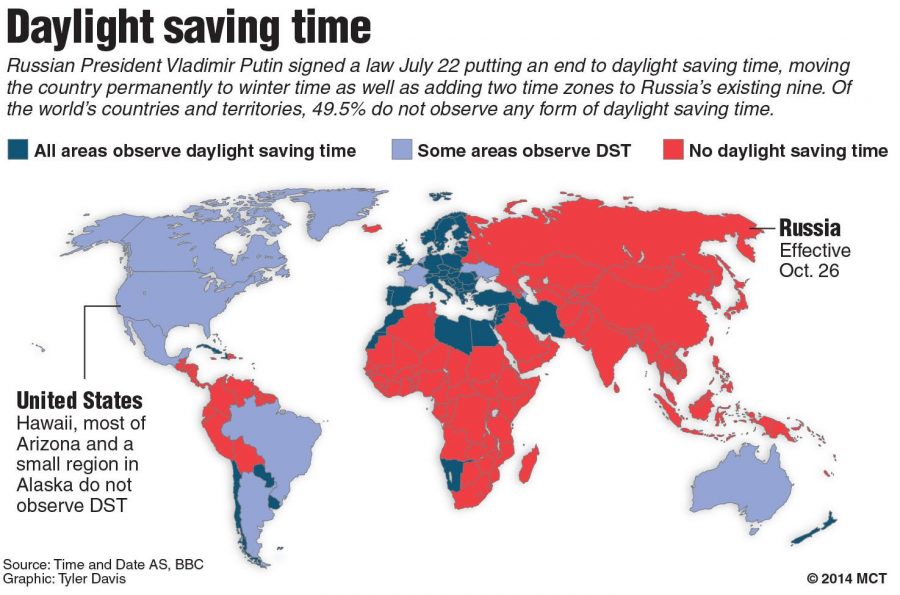‘Falling’ into effects of daylight saving time
World map showing countries that observe daylight saving time. MCT 2014
September 28, 2015
On Sun. Nov. 1 at 2 am, United States citizens will set their clocks back an hour as daylight saving time comes to an end, and fall back begins. The process of the time change also takes place in over 70 countries around the world today.
Although the time change does have its positive effects such as being able to take more advantage of the natural light and conserve electricity, studies have shown that there are negative consequences of the time change as well.
For example, the primary body clock, the brain, determines when people are alert and sleepy, keeping what is known as a circadian rhythm. This internal clock is endogenous, meaning that it regulates its own time.
The transition into or out of daylight saving time makes our cycle of alertness and sleepiness one hour off, and the circadian rhythm experiences a feeling similar to mild jet lag. Fortunately, transitioning out of daylight saving time is easier than transitioning into it.
Sophomore Yasmine Guedira prefers the fall back to spring forward, and said, “I don’t like spring forward because I’m losing an hour [of sleep], and when I have to go wait for the bus in the morning, it’s so cold and dark and I’m so confused!”
This is because people are gaining an hour of sleep, not losing it. For every hour of time change, it generally takes the body a day to adjust, so the average person needs only one day to adjust to the time change.
Sophomore Sydney Bahr agrees fall back is much easier to transition into.
Bahr said, “I like fall back because it allows me to get more sleep, but I don’t like spring forward because it makes me even more tired and disoriented than I usually am.”
However, although we can adjust fairly quickly, the change can still affect the amount of sleep people get, and their levels of alertness during the day. The out of average amounts of sleep can cause multiple risks.
Some of these include car accidents, injuries and even heart attacks due to stress hormones being released from lack of sleep. This can cause inflammation and increased risk for people who already suffer from heart complications.
Not everyone is negatively affected by the time change; it varies from person to person, and it may even have little to no effect on someone. Some may even find the change beneficial, like sophomore Levan Kelly.
Kelly said, “I like it in the fall because I get another hour to sleep, and overall it doesn’t really effect me that much.”
However you feel about it, the time change continues to come closer and closer as September draws to an end.
How does ‘falling back’ effect you?







